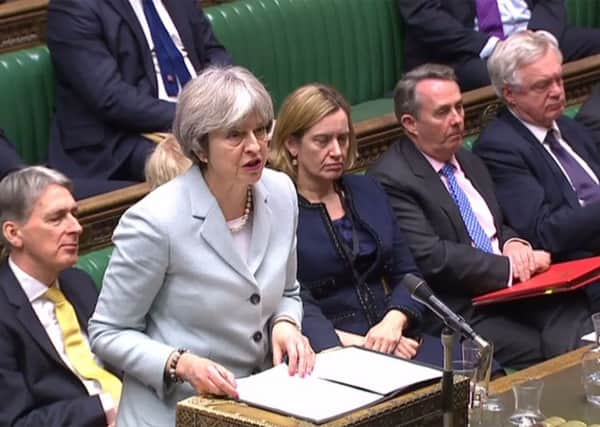Brexit: Theresa May pledges to protect workers' rights


Theresa May has pledged that protections for UK workers will not be eroded after being challenged by MPs over reports that ministers want to scrap the 48-hour week after Brexit.
The Prime Minister was asked eight times by opposition MPs whether the government was planning to repeal the European working-time directive, and told MPs: “I have said that we will maintain workers’ rights, and indeed enhance workers’ rights.”
Advertisement
Hide AdAdvertisement
Hide AdLabour leader Jeremy Corbyn has urged Mrs May to “face down” Cabinet ministers who want to scrap EU regulations which limit the average working week.
The Prime Minister also came under fire from her own MPs, with pro-Brexit back bencher Jacob Rees-Mogg warning that the UK would be “no more than a vassal state, a colony, a serf of the European Union” if it retains Brussels rules during a transition phase, as the government intends.
Following reports that Conservative MPs who rebelled to force an amendment to the EU (Withdrawal) Bill had received death threats, Mrs May condemned all abuse suffered by parliamentarians as a result of Brexit divisions.
“There can never be a place for the threats of violence and intimidation against some members that we have seen in recent days,” she said.
Meanwhile, a Brexit sub-committee of the Cabinet held the first discussion on what the UK’s final relationship with the EU should look like, without reaching any conclusions.
Cabinet ministers closely involved with Brexit talks considered options for UK-EU trade in a Downing Street meeting which lasted just over an hour and a half.
Brexiteers such as Boris Johnson, Michael Gove and Liam Fox, alongside Gavin Williamson, were understood to be vocal on the need to “diverge” from EU regulations.
It is believed “soft” Brexit backers such as Chancellor Philip Hammond and Home Secretary Amber Rudd leaned further towards “alignment” with Brussels rules to maintain close ties with the EU. There was discussion of a potential “gradual divergence” – a step-by-step move away from EU laws after Brexit.
Advertisement
Hide AdAdvertisement
Hide AdA senior adviser to chief EU Brexit negotiator Michel Barnier warned yesterday that a post-withdrawal transition period is “not a given”.
Stefaan De Rynck said the EU wanted to have a fully-written withdrawal treaty ready for ratification by October next year, but said the UK would not be allowed to pick and choose a “buffet” option.
He stressed that a free trade agreement could not be done on a sector-by-sector basis, as has been suggested by some Brexiteers who want different rules for areas like the car industry or the City.